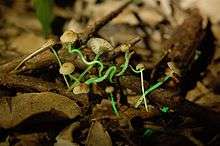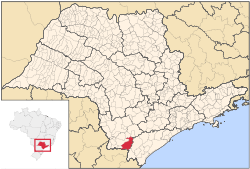Mycena luxaeterna
Mycena luxaeterna, common name eternal light mushroom, is a species of fungus in the Mycenaceae family. The mushrooms have parachute-shaped caps which start off darkly grayish-brown, changing to grayish-yellow or pale grayish-brown with a pale white ring at the edge when mature, and reach up to 2 cm (0.79 in) in diameter. Their thin, cylindrical, hollow, fragile stems up to 8 mm (0.31 in) in diameter are covered in a thick gel and emit a constant yellow-green bioluminescence (the caps do not glow). The gills are attached. The mushroom has a slightly radish-like smell and similar slightly bitter taste. It has been assigned the MycoBank number MB 515160.[1]
Habitat
The mushroom was discovered in a very limited area of the Atlantic rain forest of São Paulo, Brazil and is known to exist only at this location. It grows on decomposing twigs, rarely on dead leaves or undergrowth, in clusters of two-to-twenty individuals. Dennis Desjardin is credited with the discovery.[1]
Uses
The eternal light mushroom has no known nutritional value, contains no known hallucinogens, and is not reported as having any particular cultural significance. Its extreme rarity means that it has never been common in cooking.
See also
References
| Wikimedia Commons has media related to Mycena luxaeterna. |

